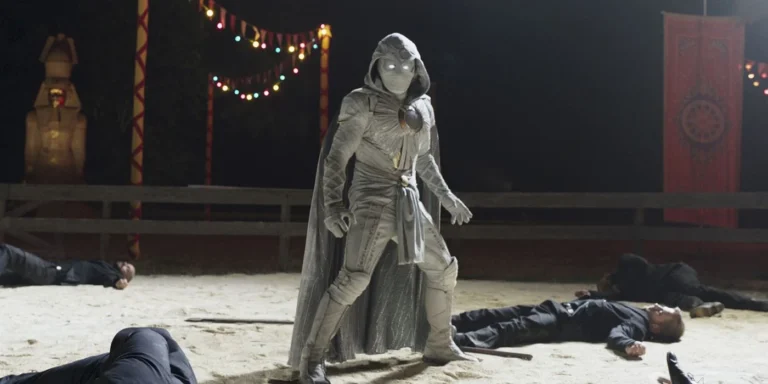If you’ve been looking for a slice of superhero action that doesn’t require a near-encyclopedic knowledge of dozens of interconnected films and television shows, then Marvel’s Moon Knight is just what the doctor ordered. Premiering this week on Disney+ and taking place within the Marvel Cinematic Universe while having no direct narrative ties (at least in the four episodes provided to press), the series follows Steven Grant (Oscar Isaac), a museum gift shop employee with a sleeping disorder that frequently causes him to awake in strange places with no recollection of the circumstances that led to his arrival.
Steven’s affliction is so severe that he’s begun chaining his ankle to the bedpost at night, sealing the door to his flat with painter’s tape, and sprinkling sand all over the floor to capture evidence of his somnambulism. Even with these measures, it’s clear Stephen is struggling; he rarely appears onscreen without looking frazzled and exhausted, and there’s a nervous energy about him that his fellow employees clearly find off-putting. His only solace is the museum’s current exhibit on the culture of ancient Egypt, an area where Steven considers himself an expert — in fact, he’d love to be a tour guide, but his supervisor seems to relish assigning him to as many belittling tasks as possible.
As Steven’s condition deteriorates, the blackouts become more frequent; he’s losing days at a time, strange voices are echoing in his head, he’s missing appointments he doesn’t remember making in the first place, and one afternoon he awakens in what appears to be the Bavarian countryside, surrounded by bloody bodies. Just what the hell is going on? What’s with the cell phone he found stashed away behind a panel in his apartment? Why does the stranger who keeps calling the phone address him as “Marc”? And what’s the connection to spiritual guru Arthur Harrow (Ethan Hawke), a holy man of sorts who believes Steven to be in possession of an important artifact tied to an Egyptian goddess?
Rest assured, Moon Knight will answer these questions, and reveal plenty of other secrets along the way. But the storytelling takes a backseat to Isaac’s manic performance, juggling multiple accents and distinctly different personalities as Steven wrestles with the voices inside his head. There’s a playfulness here, but one that has less in common with Guardians of the Galaxy or Thor: Ragnarok‘s wink-at-the-camera irreverence and feels more akin to Tom Hardy’s goofy, wildly off-kilter work in the Venom franchise. Take, for example, the first time Steven consciously conjures up the mystical costume that provides his masked alter ego with superpowers: what most comic book properties would position as an über cool moment of badassery, Moon Knight elects to play for laughs, and to great effect.
Not that it’s all silly, mind you: Ethan Hawke’s antagonist is wonderfully creepy — the veteran actor has admitted to taking inspiration from cult leader David Koresh — and there are some solid action beats in the first few episodes, although the visual effects sometimes feel dodgier than we’ve come to expect from Marvel. But the real treat comes in the latter half of the fourth episode, where Moon Knight takes a narrative detour that completely upends the preceding installments, opening up a number of intriguing possibilities for its conclusion. Viewers that enjoyed the mind-bending weirdness of WandaVision and Loki could potentially have a lot to look forward to here, provided that Moon Knight manages to stick the landing after its solid initial offering. But even should it stumble, there’s little doubt that Oscar Isaac’s kooky performance is reason enough to tune in.

